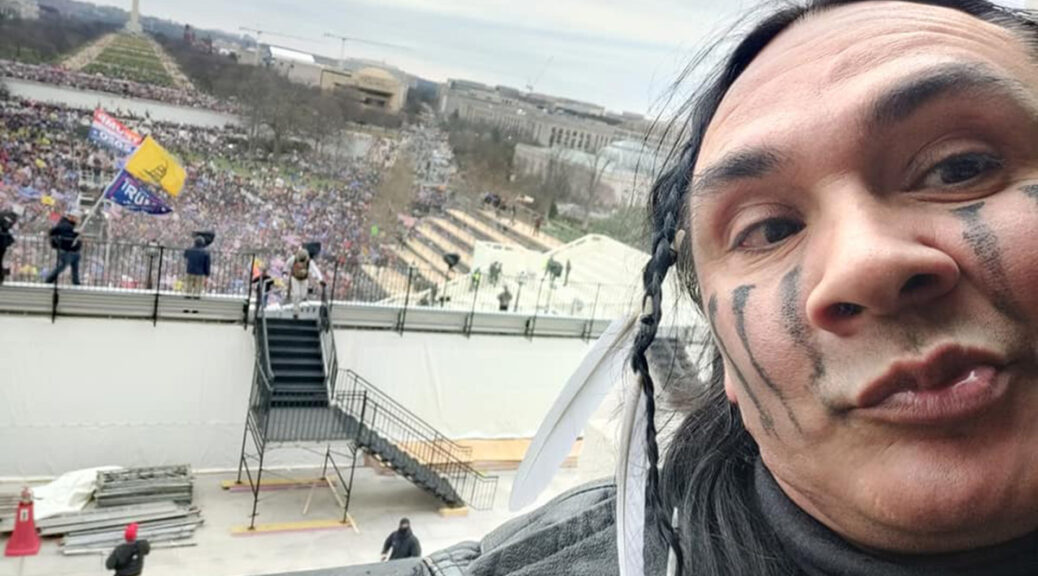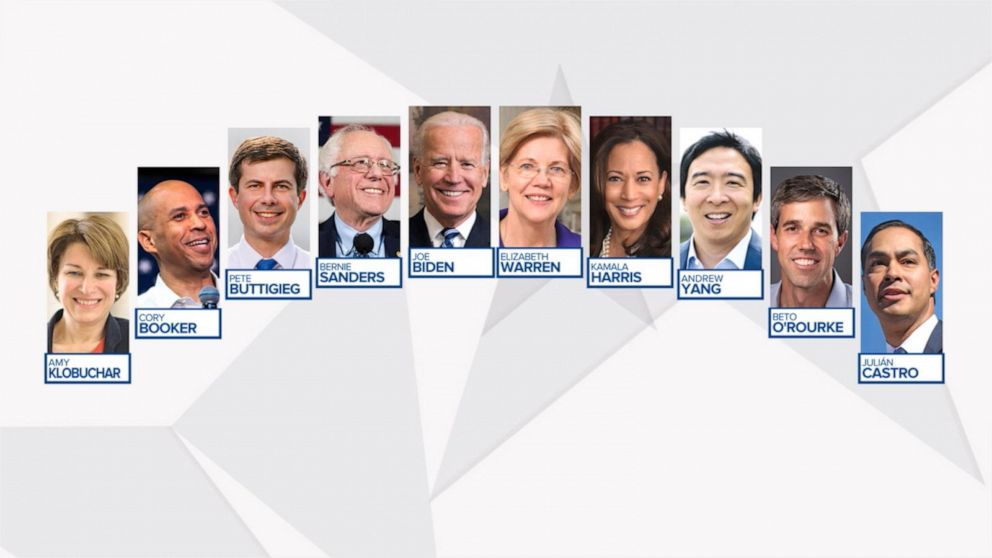Ten
Democrats have qualified for the third debate to be held tomorrow night in
Houston. While it is almost certain that
the moderators will not ask candidates about issues affecting Indian Country,
there are important questions out there that a committed President might
address. The shift in tone from the
Obama years to Trump could not be more stark.
The President’s racism and hostility towards Native Americans is readily
apparent. Though some native
communities, like the Crows, favor the current administration’s friendly stance
towards coal mining, other native peoples find the president’s attacks on
Elizabeth Warren, despite her claims about her identity, as off-putting, and
his environmental policies a direct threat to their nations. I have written at length about President
Trump on this blog, and in the coming weeks I will look at what he and the
three declared Republican candidates have had to say about native peoples. In the meantime, let’s look at what the
Democrats are up to.
Joe
Biden has not
produced a document describing his policy goals for Native Americans. During
the debates he emphasized that the United States was a nation of immigrants. Context
is important: Biden was criticizing Trump’s demonstrated cruelty toward those
who have crossed the southern border, but statements like this can grate on
Native Americans because it appears dismissive of their historical experience
as the original inhabitants of the continent. Biden chose not to attend the
Frank LeMere Native American Presidential Forum in Iowa, which might have
offered him a chance to lay out an agenda and talk about the generally
favorable policies of the Obama
Administration. He did salute Sharice Davids and Deb Halland on
their election to the House of Representatives back in November of 2018. Biden has said little specifically about
Native American concerns, but he did introduce the first version of the
Violence Against Women Act when he served in the Senate, and he worked for its
reauthorization as Vice-President under President Obama.
Corey Booker has a set of policies on his
website for “Animal Welfare,” but nothing so far for Native Americans. Still,
he mentions Native Americans frequently, and he hopes if elected to “invest in
rural and Indian Country.” His
environmental proposals include stepping “up efforts to defend communities of
color, low-income communities, and indigenous communities by doubling staffing
in all EPA enforcement offices.” Booker’s environmental policy statement shows that he is aware
that “a full one in eight Native Americans do not have reliable access to water
and Black families are twice as likely as white families to live without modern
plumbing”. In his call for cleaning up
abandoned coal, uranium and hard rock mines across the country, he points out
that “Native American miners, essential to the nation’s nuclear development
efforts, are particularly at risk,” and that “1200 of the nation’s 4000
abandoned uranium mines are located on or near Navajo reservations.” On the 26th of August, Booker tweeted out his support for the Cherokee
Nation’s effort to appoint a delegate to the House of Representatives, and earlier
that month, in a speech at an AME Church, Booker referred
to Jefferson’s description of native peoples as “savages” and argued that
“bigotry was written into our founding documents.” It is unlikely that Booker
will point out that according to a DNA test he took for Henry Louis Gates’
program Finding Your Roots, he “is 7
percent Native American.” Booker himself
wrote in 2016 that “I am descended from slaves and slave owners. I have Native
American blood and am also the great-great-great grandson of a white man who
fought in the Creek War of 1836, in which Native Americans were forcibly
removed from their land.”
Pete Buttigieg has called for Congress to pass Savanna’s Act
. As mayor of South Bend, he was involved in working with the Pokagon Band
of Potawatomi Indians to build a housing and government complex, as well as a
$400 million dollar hotel and casino. The Pokagon Band appreciated Buttigieg’s
assistance and in a ceremony in November of 2016 presented him with a ceremonial
blanket. He has ambitious plans for improving health care in rural America that
he says will benefit Native peoples. In
an interview posted online by the Des
Moines Register on July 27th, Buttigieg said that he was still
working on a set of policies for Native Americans. He has not released a policy statement as of
yet.
Julian Castro was the first Democratic candidate
to release a detailed policy proposal for Native Americans. I have written about Castro’s plan on this blog, and will say nothing
more about it on this time. Elizabeth
Warren gets a lot of credit for being the candidate with “a plan for that.”
Castro it appears as well has a wide breadth of knowledge and a team that is
helping him craft sound policy statements.
Kamala Harris earned the wrath of gaming tribes in California where
she served as Attorney-General.
According to a report by David Palermo on Pechanga, “in her five years in office,
Kamala has opposed at least 15 land-into-trust applications.” During her run
for the Senate, the California Democratic Party Native American Caucus
expressed “deep concerns” about both Harris and her opponent. “We are dismayed by the lack of sensitivity
to tribal issues and to Native Americans as individuals that we see in our
announced candidates,” said Mary Ann Andreas, a council member with the Morongo
Band of Mission Indians. “Their comments
and actions provide little assurance that they grasp the
government-to-government relationship guaranteed by the U.S.
Constitution.” Harris skyped into the Frank LeMere forum in
Iowa. In response to one question, Harris said that “I strongly believe and
take very seriously and we must acknowledge that the government of the United
States stole lands and took lands from the tribes.” That is a point few people who study Native
American issues would disagree with, and it borders on the edge of common
knowledge. But it also is a statement any candidate could make and required
little preparation, study, or understanding of the principal issues. What might
it mean for a President to acknowledge that the United States sits on a stolen
continent? The consequences of a President doing so are significant. Harris is
trying to address the skepticism native peoples in her home state have felt
about her for quite some time. During her time in the Senate, she has
co-sponsored and supported the Native American Voting Rights Act and Savanna’s Act, among other pieces of
legislation, and criticized Trump judicial nominees for their opposition to tribal
sovereignty.
Amy
Klobuchar
hails from a state with a significant Native American population, and when she
applied for college as a 17-year-old, wrote about Dee Brown’s Bury My
Heart at Wounded Knee as the most important book in her life. At the Frank
LeMere forum in Iowa, Klobuchar said she understood well the importance of
state and federal officials engaging in consultation with native
communities. She told the audience that
“I will respect sovereignty and I will strongly believe in
government-to-government negotiations and consultation.” Klobuchar is knowledgeable about issues of
missing and murdered Indigenous women, and has argued that her plan for infrastructure, should she be elected, will help
native communities. Based on her career in the Senate, and her time in
Minnesota politics before that, Klobuchar was perhaps more knowledgeable about Native American issues
coming in to the campaign than any other candidate. Though she has not produced on her website a
detailed position statement, it is difficult to imagine that she would disagree
much with the policies identified by Castro and Warren. And she has none of the problems presented by
a Warren candidacy.
Beto O’Rourke was asked during a campaign stop in
Oklahoma, “Native America! What about us?”
He tweeted
out video of his answer. He mentioned Murdered and Missing Native American
women who disappear at ten times the rate of the general population. #MMIW and #MMIWG is an equal protection issue
for O’Rourke. He showed his familiarity
with the history of violence and greed that has been the story of Oklahoma.
Aware of the legacy of allotment in the west, O’Rourke suggested that unless we
as a nation confront our racist past, we can never have meaningful justice
moving forward. That is a powerful
argument. How does it translate into
policy? For O’Rourke it means respecting Native Americans when it comes to what
happens on and underneath their lands. It means increasing funding to address
the problem of #MMIW. During his time in Congress, O’Rourke voted against H.R.
538 which, in his view, aimed “to reform how Native American tribes manage
their natural resources such as minerals and other energy-related assets found
on their lands.” Why, because while he agreed that “Native Americans should be allowed
to manage their lands and natural resources,” he worried that there could be “unintended
consequences on other land and water supplies throughout the U.S. should we
exempt Native American tribes from current environmental law when they attempt
to access natural resources on their land.”
Sovereignty can be a tricky one, and it would be nice to hear a clearer
plan from O’Rourke that goes into more detail. He chose not to attend the
summit in Iowa,
Bernie
Sanders recently released his plan for “Native American
Rights.” His 2020 platform reads,
“Time and time again, our Native American brothers and sisters have seen the federal government break solemn promises, and huge corporations put profits ahead of the sovereign rights of Native communities. I will stand with Native Americans in the struggle to protect their treaty and sovereign rights, advance traditional ways of life, and improve the quality of life for Native communities.”
He believes that “Native American tribes should have sovereign control over their lands,” better access to healthcare, and that important pieces of legislation like the Indian Child Welfare Act should be preserved. Furthermore, “stereotypes and slurs against Native Americans should be discouraged and denounced.” Sanders clearly understands the complexities of law and order in Indian Country, and argues that tribes must have the ability to prosecute non-Indian perpetrators of crime on reservations. That is one reason, he says, why he co-sponsored the Violence Against Women Reauthorization Act of 2013. He supports the “10-20-30 Bill” which would “invest 10 percent of rural development funds into the communities where at least 20 percent of the population has lived below the poverty line for the last 30 years.” He has voted to protect Native American lands from corporate exploitation, including the Keystone XL Pipeline, which he vehemently opposes.
Elizabeth Warren’s strong command of the issues has been undermined by her false claims to Cherokee ancestry. I have written about her claims, and about her foolish decision to trumpet the results of a DNA test. I have also written about the President’s “Pocahontas” name-calling, which is sure to catch on with the most deplorable of the troglodytes who follow him. Warren has apologized for her claims to Native American ancestry, but it appears that this may not be enough for some Democratic voters. And this might be unfortunate, for the Warren campaign has written a detailed and sound policy proposal. Despite a long history of “discrimination, neglect, greed, and violence,” Warren points out that “Tribal Nations and indigenous peoples have proven resilient and continue to contribute to a country that took so much and keeps asking for more.” Despite small progress, the United has failed in its “legal, political, and moral obligations toward tribal governments and indigenous peoples.” Warren says that “Washington owes Native communities a fighting chance to build stronger communities and a brighter future.”
How to do that? Warren, along with
Representative Deb Haaland, assembled a legislative proposal for what they will
call the Honoring Promises to Native Nations Act. It will not address every
problem but, Warren says, “it will represent an urgently needed and
long-overdue step toward ensuring that the United States finally, and for the
first time, fully meets its resource obligations to Indian Country.” The Honoring Promises plan, she says,
will seek to end the problem of inadequate funding by removing these programs from the traditional appropriations process and instead ensuring predictable, guaranteed funding for all of these vital initiatives — no matter the circumstances in Washington.Predictable, guaranteed funding can take a variety of forms, including multi-year advanced appropriations and sequestration exemptions; automatic inflation adjustments to ensure that adequate support does not erode over time; and mandatory funding available under all circumstances, like Social Security, Medicare, or Medicaid. Trust and treaty obligations do not vanish because of political games in Washington; federal funding must no longer vanish for these reasons, either.
Warren’s
policy proposal is lengthy, detailed, and well-informed. I recommend that you
read it. Only Castro’s comes close in
terms of its thoroughness. The Cherokee claims are a problem for many voters,
and have given ammunition to the President and his racist supporters, but
Warren has studied this issue and has a well-researched set of policy proposals
in place.
Andrew Yang has said little about Native
Americans. His UBI Plan, or Universal Basic Income, would help Native American
families. Yang did not attend the Frank LeMere Forum in Iowa and his website,
filled with policy proposals, includes nothing related to Native Americans.
The Top Tier: Warren and Castro have
devoted the most time and energy to Native American affairs thus far in their campaigns. Whatever one thinks of Warren’s identity
claims in the past, she and Castro clearly lead the field in this issue.
The Next Best: Because Sanders has taken the time
to produce a set of policy proposals, and because of Klobuchar’s experience in
Minnesota and in the Senate working on Native American issues, they belong
below Warren and Castro.
The Rest of the Pack: Booker, Buttigieg, Harris, and O’Rourke
have all responded to questions about Native Americans in a manner that shows
their familiarity with the fundamental issues.
Each of them can do more. That these candidates have explicitly
characterized much of American history as “racist” is notable: I am not sure I
can remember this many Democratic candidates asking their supporters to take a
long look at the nation’s history. This
has come through their discussions of the legacy of slavery, and the nation’s
treatment of native peoples.
Disappointing: Biden has had a long enough career
that his inattention to Native American issues cannot be ascribed to a rookie
mistake. He can and should do more. I am not sure what to make of Yang’s
candidacy, but clearly Native American issues are not on the list of matters he
considers importance.
Native
Americans make up a small percentage of the American population, but they can
tip an election in Montana, and in the Four Corners states. They are an important voting bloc in Alaska
and throughout the western states and the western Great Lakes. Beyond their electoral importance, a
Presidential candidate’s views on Native Americans, I would argue, can tell us
something about their understanding of history, their appreciation of the
complexities of the federal constitution, and, most of all, their
understandings of justice and equality. Even
Warren and Castro, who have done considerably more than their rivals, have not
addressed every issue. The candidates’ discussions of sovereignty are ambiguous
and undefined: they speak of consultation, which is important, and allowing
tribes the right to control what takes place on Indian land, but they do not
clearly say how far they are willing to go.
Their definitions of sovereignty are considerably less than those laid
out, for instance, in the United Nations Declaration of the Rights of
Indigenous Peoples, a document none of the candidates has mentioned. Neither have the candidates discussed the
high rates at which police are killing Native Americans. Their solutions to address poverty seem to emphasize
economic development, which can have serious negative consequences. They seem
almost completely unaware that many native peoples do not live on Indian
reservations. Still, the attention we
have seen thus far given to the issue is unprecedented, and that is a product
of the hard work of Native American activists and their allies who have pushed
the government to do something about the scourge of missing and murdered
indigenous women, and about the despoliation of tribal lands by corporate
interests. We have candidates for a major party’s nomination talking openly and
energetically about the nation’s exploitative, violent, and racist past. There
is no reason, furthermore, to believe that the candidates who have not spoken
about the issues would disagree with Warren and Castro on the broad policy
questions, and some of the solutions candidates have suggested are creative and
refreshing. There is little doubt that
Democrats view Native American issues as much more important than does the
Trump Administration, that they are more willing to listen to native peoples,
and that they will reap the resulting small rewards on Election Day. Whether that is enough is another question.





